1、朱莉娅·博斯基,伊萨赫·德·班克尔,弗朗索瓦·克鲁塞,让-克劳德·阿德琳,艾玛奴艾蕾肖莱,肯内斯·库兰汉姆,米雷耶·佩里耶,Laurent,Arnal,狄迪尔·弗拉蒙,雅克·德尼,Cécile,Ducasse,Clementine,Essono,Jean-Quentin,Châtelain,Essindi,Mindja,Donatus,Ngala,Jean,Bediebe 主演的电影《巧克力》来自哪个地区?
爱奇艺网友:电影《巧克力》来自于法国 / 西德 / 喀麦隆地区。
2、《巧克力》是什么时候上映/什么时候开播的?
本片于1988年在法国 / 西德 / 喀麦隆上映,《巧克力》上映后赢得众多观众的喜爱,网友总评分高达793分,《巧克力》具体上映细节以及票房可以去百度百科查一查。
3、电影《巧克力》值得观看吗?
《巧克力》总评分793。月点击量1次,是值得一看的剧情片。
4、《巧克力》都有哪些演员,什么时候上映的?
答:《巧克力》是1988-05-18上映的剧情片,由影星朱莉娅·博斯基,伊萨赫·德·班克尔,弗朗索瓦·克鲁塞,让-克劳德·阿德琳,艾玛奴艾蕾肖莱,肯内斯·库兰汉姆,米雷耶·佩里耶,Laurent,Arnal,狄迪尔·弗拉蒙,雅克·德尼,Cécile,Ducasse,Clementine,Essono,Jean-Quentin,Châtelain,Essindi,Mindja,Donatus,Ngala,Jean,Bediebe主演。由导演克莱尔·德尼携幕后团队制作。
5、《巧克力》讲述的是什么故事?
答:剧情片电影《巧克力》是著名演员朱莉娅 代表作,《巧克力》免费完整版1988年在法国 / 西德 / 喀麦隆隆重上映,希望你能喜欢巧克力电影,巧克力剧情:小女孩法兰西的父亲安东是个野心勃勃的军官,一心在非洲大陆上建立自己的事业于是,母亲比安拉(Giulia Boschi 饰)和法兰西就离开了繁华的巴黎来到了这片原始的土地。在这里,他们雇佣了一名黑人仆人菩提(Isaach De Bankolé 饰)。安东离家的日子,总是菩提细心的照顾着这母女俩,渐渐的比安拉与菩提之间产生了一种微妙的情愫。
1988年,已经给里维特、文德斯、贾木许等多位名导担任过副导演,积累了丰富经验的克莱尔•丹尼斯,不再甘当绿叶,推出了半自传体电影《巧克力》,开始在电影界崭露头角。二战之后,世界政治格局发生了巨大变化,第三世界国家纷纷独立,法国在非洲的殖民历史也渐告结束。《巧克力》就是在此背景下,以导演自身在非洲的童年生活为蓝本,从一个小女孩的视角讲述了一个法国军官家庭在非洲殖民地喀麦隆的生活。颇具玩味的是,片中小女孩名叫法兰西(France),然而天真无邪的小女孩却让人很难和贪婪残暴的殖民者形象等同或者联系起来。典型的殖民者是意外到访主角一家的军官夫妇和种植园主,他们颐指气使、高高在上,生病了也不让黑人医生治疗,把黑人当作下等人、奴隶、机器。与此相应,片中典型的被殖民者代表就是男仆菩提了。他表面上温顺、可靠,对主人言听计从,但骨子里自有一种尊严和操守。服侍法国人生活起居是他作为被殖民者不得不做的工作,并非心甘情愿。他可以尽忠职守做好份内工作,但绝不会全心全意的对待法国人,因为在他心目中,法国人是侵略者,是敌人,跟自己界限分明。法国人可以奴役他的身体,却永远无法扭曲他的独立人格,征服他的自由灵魂。因此,当他洗澡被女主人看到后,留下了屈辱的泪水,而当女主人向他示好时,他断然拒绝。就连小女孩对他的依恋和友情,也被他以痛苦的方式(烫伤她也烫伤自己)了断了,还有片中唯一倡导自由平等的法国人路克,也无法被他接纳,这一切都是因为——他们是殖民者!身为奴隶,却不具奴性,菩提身上折射出了全世界的被殖民者形象。
殖民历史终将过去,殖民者作威作福的日子终将结束,《巧克力》中的法国人也深知这一点。无论是菩提身上体现出来的黑人对法国殖民者深深的恨意,还是黑人医生参加的深夜集会所暗示的秘密反抗运动,都预示着殖民地解放运动已是山雨欲来风满楼。如果说《巧克力》对殖民主义破灭的描绘还有些侧面和隐晦,二十年后的克莱尔则剥去了这层面纱,直捣黄龙。2009年,在法国著名女星伊莎贝尔•于佩尔的推动下,成名多年的克莱尔重返她的非洲故乡,再次奏响了一曲悲怆的殖民地挽歌——《白色物质》。白色物质一词在《巧克力》中就出现过,是黑人对白人的蔑称,直译白鬼,这个极具挑衅性的片名无疑为影片定下了冷酷的基调。影片以一个法国女咖啡种植者玛丽亚为核心,讲述尽管时局动荡黑人暴乱,她也固执地不愿离开生活多年的非洲,最终梦想破灭、家破人亡。她“错把杭州作汴州”,把殖民地当作自己的土地来经营和爱护,最终却绝望地发现,平时熟悉的土著居民都仇视她,这块土地根本没有接纳她。时隔多年,克莱尔早已褪去了《巧克力》中的青涩和浪漫,影片用动感十足的纪录手法,拍得极具现代感,而法国女性于佩尔表现则是一如既往的出色。威尼斯电影节上,李安作为评审团成员表示,很遗憾没能给这部影片颁一个奖。
之前写作业的时候有写过影评
Chocolate (Denis, 1988)
Claire Denis' first film, Chocolate, is also a semi-autobiographical feature film. It narrates the tale of France, a French lady who travels alone from France to the African continent where her childhood is depicted in order to locate the home she once called home. From the viewpoint of
child Frannce, Denis recreates daily life in the French colony and the complicated bond between black slaves. nThe film's topics include the complicated feelings between whites and blacks as well as the
identities of colonizers and colonized people.For instance, in the friendship between France and Protee, She would eat Protee's ant-covered bread as they both shared a dinner. Amiee, France's mother, has feelings for Protee but carefully hides them. Through numerous means, she tempts Protee but is rebuffed. She purposefully kisses her husband in front of Protee when he returns. Amy suggested to her husband that Protea be transferred to work at the garage where he would spend the entire day staring at the noisy machinery.It is difficult to cat
egorize and evaluate Protee's connection with young France or his murky relationship with Amiee. Their intertwining is a metaphor for colonialists' ambition for the African continent as well as a
struggle between want and feel.For example, the "bathing" scenes in the film. Amiee has private bathroom,which n
obody can see her, is in sharp contrast to the public open air bathroom used by Protee. In the film, "private space" represents prestige, dignity, and desire. Protee's body is exposed in broad daylight, and Amiee may readily stare at it, just as the African ground beneath his feet accepts the
u0000
ee when he returns. Amy suggested to her husband that Protea be transferred to work at the
garage where he would spend the entire day staring at the noisy machinery.It is difficult to categ
orize and evaluate Protee's connection with young France or his murky relationship with Amiee. T
heir intertwining is a metaphor for colonialists' ambition for the African continent as well as a strug
gle between want and fe
el.For example, the "bathing" scenes in the film. Amiee has private bathroom,which nobody ca
n see her, is in sharp contrast to the public open air bathroom used by Protee. In the film, "private
space" represents prestige, dignity, and desire. Protee's body is exposed in broad daylight, and
Amiee may readily stare at it, just as the African ground beneath his feet accepts the colonists' eager scrutiny without any shelter or resistance.
Title: Chocolat
Year: 1988
Genre: Drama
Country: France, Cameroon, West Germany
Language: French, Hausa, English, Arabic
Director: Claire Denis
Screenwriters: Claire Denis, Jean-Pol Fargeau
Music: Abdullah Ibrahim
Cinematography: Robert Alazraki
Editors: Monica Coleman, Claudine Merlin, Sylvie Quester
Cast:
Isaach De Bankolé
Giulia Boschi
François Cluzet
Cécile Ducasse
Mireille Perrier
Jean-Claude Adelin
Didier Flamand
Laurent Arnal
Emmanuelle Chaulet
Jean-Quentin Châtelain
Kenneth Cranham
Jacques Denis
Emmet Judson Williamson
Jean Bediebe
Essindi Mindja
Saïdou Abatcha
Rating: 7.8/10
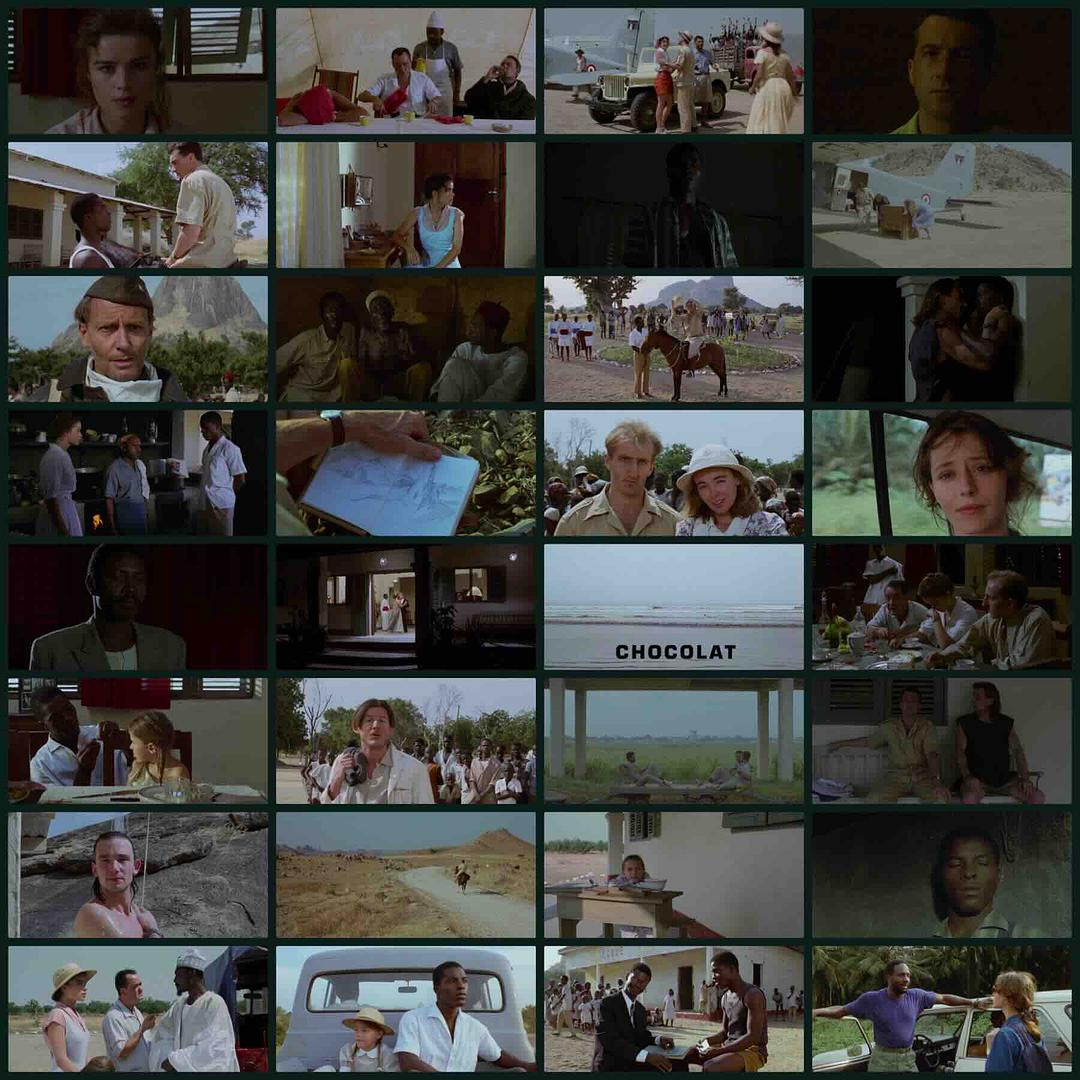
Title: White Material
Year: 2009
Genre: Drama, War
Country: France, Cameroon
Language: French
Director: Claire Denis
Screenwriters: Claire Denis, Marie N’Diaye, Lucie Borleteau
Music: Stuart Staples
Cinematography: Yves Cape
Editor: Guy Lecorne
Cast:
Isabelle Huppert
Christopher Lambert
Nicolas Duvauchelle
Michel Subor
Isaach De Bankolé
William Nadylam
Adèle Ado
Ali Barkai
Daniel Tchangang
Rating: 7.7/10
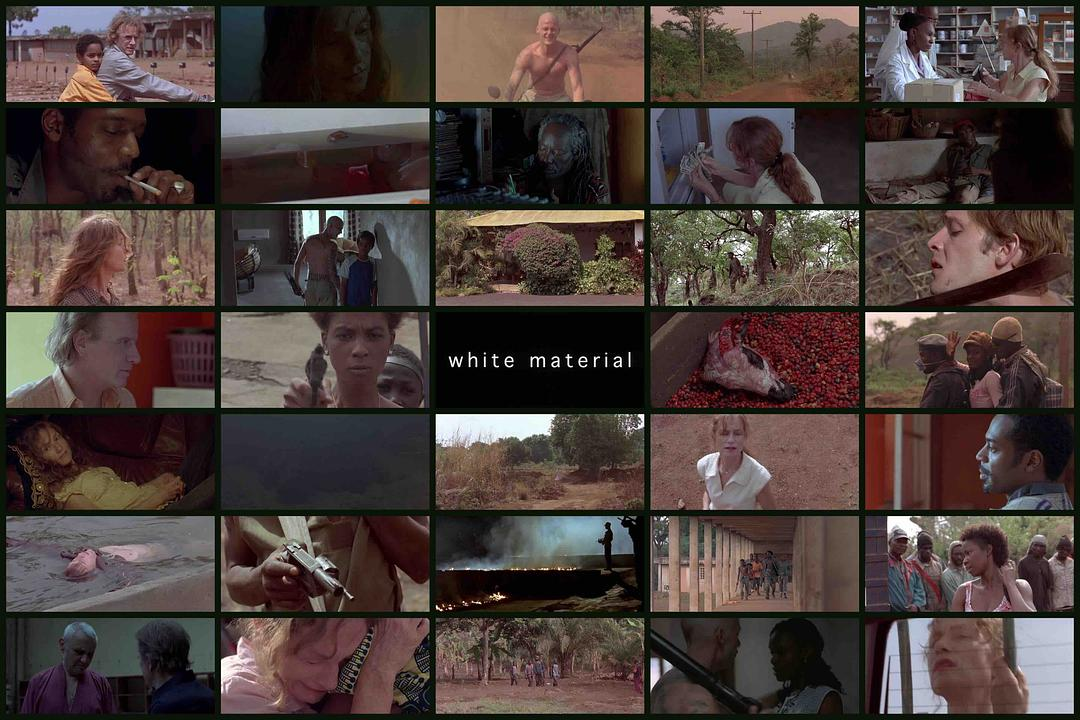
French cinema doyenne Claire Denis (1946-) was raised in colonial French Africa, and naturally this unique upbringing and experiences can be mirrored in her corpus. Principally, her debut feature CHOCOLAT, a semi-autobiographical account of her memory lane and two decades later, WHITE MATERIAL, her collaboration with an indomitable Isabelle Huppert mired in a post-colonial cul-de-sac. Prompted by the overt chromatic references in both titles, the two films fittingly comprise a diptych, an intriguing and fine-grained postmortem of French colonization’s racial tension and psychological pathologies in the African lands.
CHOCOLAT starts with a frame story about a young woman France (Perrier) returning to Cameroon to revisit Mindif, then segues into a reminiscence of her childhood days there in the 1950s. Her father Marc (a handsome, temperate Cluzet) is a French administrator, a preteen France (Ducasse) spends most of her time with her mother Aimée (Boschi, beguiling inscrutable), and their houseboy Protée (Bankolé), a beautifully virile young man in his prime.
France is very close to Protée, and their interactions often breach formality (sharing a piece of bread roaming with ants?). But so is Aimée, who often is left alone to field the quotidian domesticity while Marc is elsewhere for his official missions. Yet, as adults, the breaching of the master-and-servant boundary is more covert. Aimée making out with Marc in front of Protée is a subtle form of seduction, and Protée's distress after believing that Aimée has seen him take a shower in the buff is a protestation of being stripped of his remaining dignity (of which one's birthday suit is the last resistance) in the colonized/colonizer symbiosis. Protée is a servant, but he holds his head high, does his job professionally, minds his own business, refuses being bossed around. Bankolé does a strikingly memorable job to pocket Protée's displeasure, retain his dignity but not sacrificing his beneficent nature. When Aimée eventually succumbs to her desire, it is Protée’s chance to earn back his dignity, if not a brighter future.
The prickly racist undertows are tactfully lensed through France’s standpoint, stirred by a sundry of white characters who transiently beds down in France's home. Among which, Jacques Denis's coffee plantation owner is a repugnant loudmouth; Adelin's Luc appears as an airy wanderer, more than happy to sleep rough and share comestibles with the indigenes. When a medical emergency triggers the French's intrinsic distrust of the Africans, their subordinates, Luc is the first to mock their hypocrisy and egotism, but even for him, a line in the sand is drawn before an interracial affair. Denis and Fargeau's script is surgical enough to get to the point but leaves no wiggle room for hyperbole, because Denis never dwells on sentimentality, her editing pace is neat, almost rough-hewn, doesn't conform to the syntax of dramaturgy, which requests the narrative to be built with suspense, tension and drama to hook the audience.
Denis' arbitrary but slashing stylization of her storytelling, uncanny sensibility to the locations, become more evident 20 years later in WHITE MATERIAL, an unofficial sequel, where Huppert's Maria Vial oversees a coffee plantation in an unnamed African country caught in the crosshairs of a rampant civil war between the rebels and the government, in the post-colonial era of the noughties. Disrupting the temporal sequentiality and offering no indicators, the film plunges audience directly into the scramble, showing the aftermath (a way to deaden the dread that pervades the entire film) at the outset, then jumping back and forth to piece together the main topos of Maria's crusade to keep the business as usual, obstreperously ignoring all the warnings (including a bloody goat head) and exhortations to take a powder.
Honing in on Huppert's salient presence - whose petite, slender figure emanates an indefatigable vitality in perpetual movements and application. Her resolve is frantic on the inside and icily stolid on the outside. Not until near the end, she finally cracks up in a stranger's arms, only to go mental and murderous after everything she holds dear is spifflicated - WHITE MATERIAL, whose title is local African's slang for the white folk, continues and further probes the feelings of alienation and insecurity on foreign soils tapped in CHOCOLAT. The home which Maria proclaims hers isn't really hers in a lawless disarray where white privilege is dismantled. Any individual's life is expendable, and no one can guarantee to be spared (the unsettling slaying of the insensate child soldiers is executed with a delicate fashion that leaves viewers silently quiver with inhumanity on display).
The vestige of colonialism has no sway on the African people anymore, flee or stay, on which Maria's employees decide solely by their autonomy. There is no "loyal" servants to throw in their lots with their pale-skinned masters. And Manuel (Duvauchelle), the listless, molly-cuddled son of Maria and her ex-husband André (Lambert), is the epitome of white redemption, ultimately paying for the crime committed by his forebears in conflagration.
Music are often sparsely used in Denis’ films, but Abdullah Ibrahim’s jazz-inflected enchantment in CHOCOLAT is such an exquisite balm for her remembrance of her own past, against the ceaseless whirring of generators, whereas the humming, limpid, mood-setting score from Stuart Staples, the co-founder of British indie band Tindersticks, is anomalously dulcet when a band of gun-toting child soldiers maunders into the foreground, and becomes a strange bedfellow of the film’s dust-and-earth imagery.
Through both films, Denis sticks to her political leanings adamantly. Emotions are internalized, personalities are de-centered, or discolored, only to reveal the bare-bones conflict that is borne out of bigotry, supremacy, exploitation on one side, benightedness, irrationality and odium on the other side. Even if it befalls belatedly upon a perpetrator’s offspring, there will always be a payback for every crime, because the savagery residing in humanity is fathomless and primordial. As if we can hear her clear-headed plea“before knowingly committing a crime, please think twice, if not for yourself, please think of your children, think of the future.”ergo, Denis’ voice shall never be brushed aside.
referential entries: Denis’s BEAU TRAVAIL (1999, 8.0/10); Cary Joji Fukunaga’s BEASTS OF NO NATION (2015, 7.9/10).
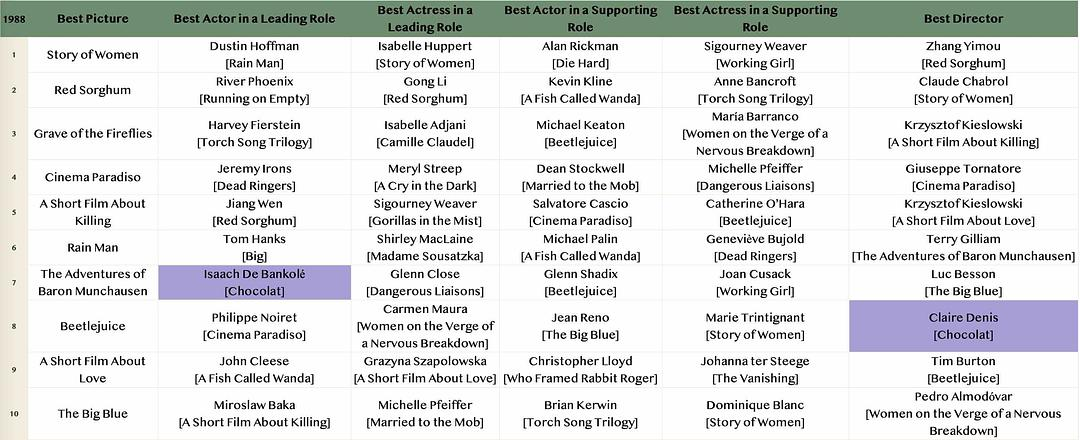
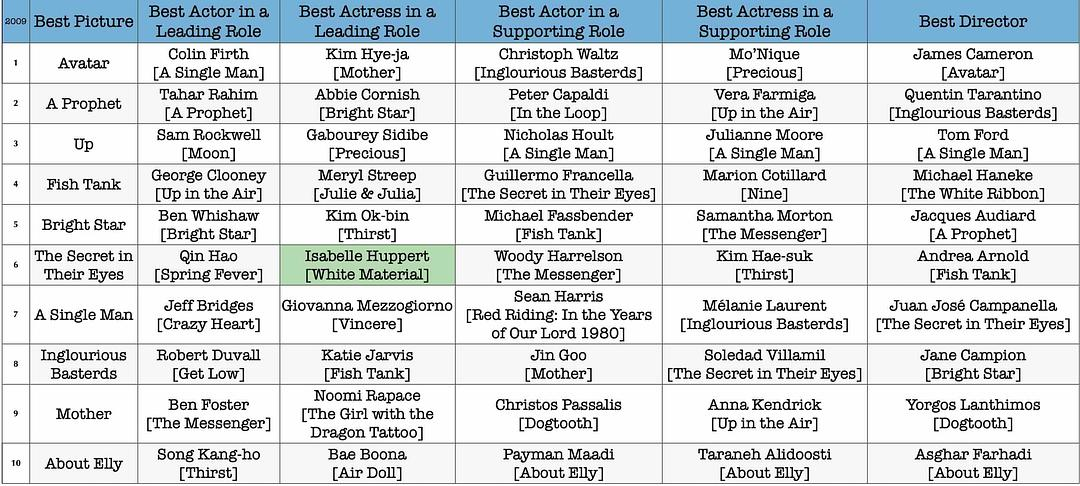
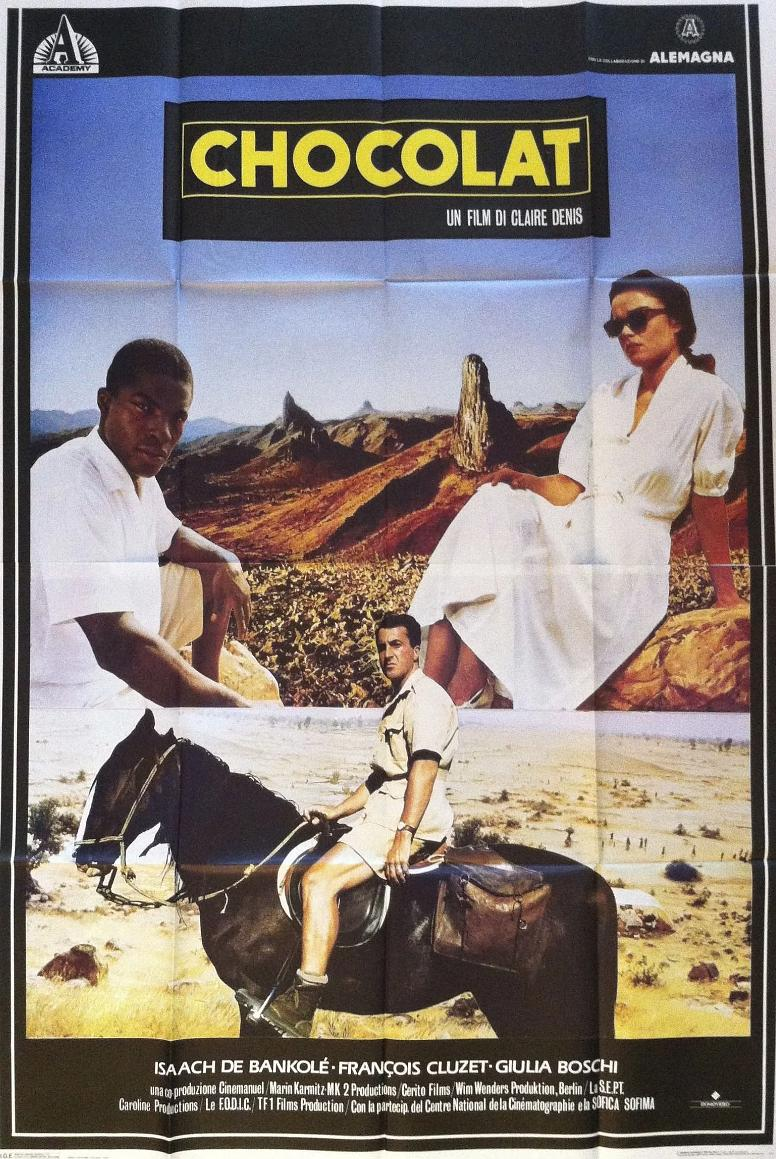
故事发生在喀麦隆小村,拍出了一种民族志的感觉
片中多次着墨当地社区的传统知识、仪式,还有语言
----------------------------------
不同时代的飞机、汽车、风景、人
数十年的变化在2个小时内跳跃式呈现
这片土地上的人一直在生存中适应,并创造文化
(片中多次出现的爵士乐就是黑人创造的)
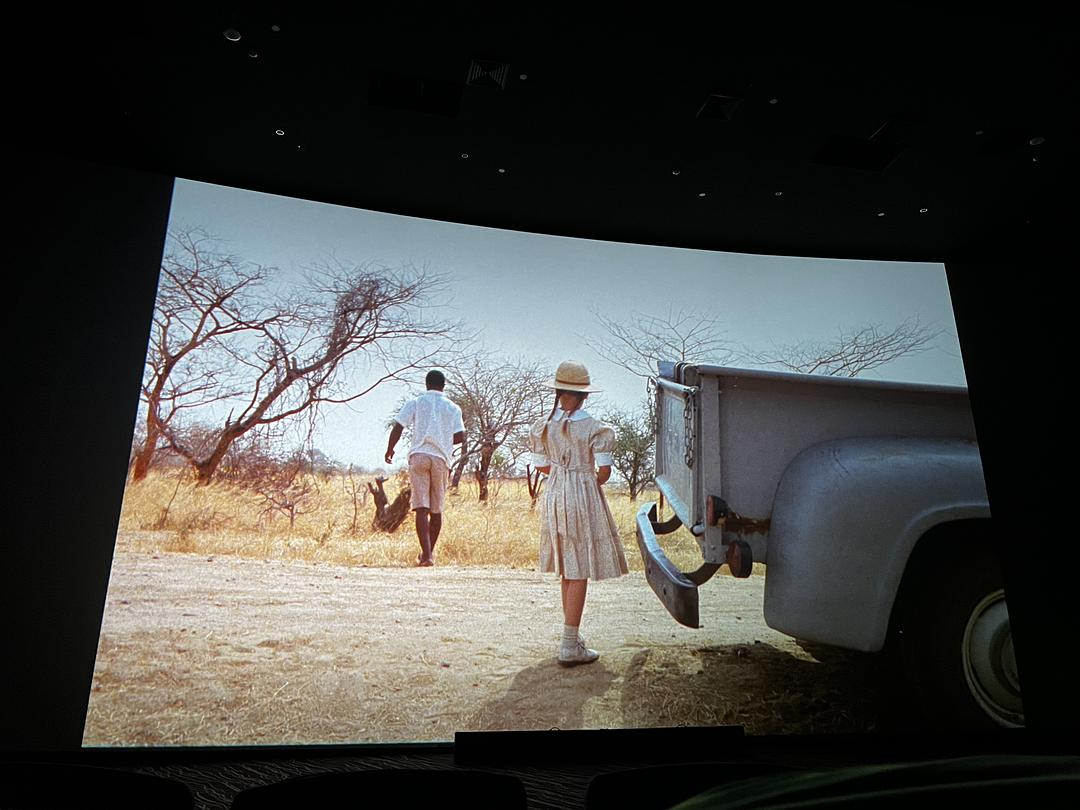
---------------------------------
这个故事表面看起来是关于殖民历史和阶级观,但我觉得更偏向于表现文化融合
----------------------------------
巧克力是指什么呢?
首先让人想到黑人的肤色
巧克力,一种往往是黑色的,容易融化,容易融合其他风味的食物
片中唯一一次提到巧克力,是说咖啡里面要加上黑巧和肉桂,巧克力可以融合在咖啡里,增加其风味,这个比喻就像黑人能融合到其他社会中一样
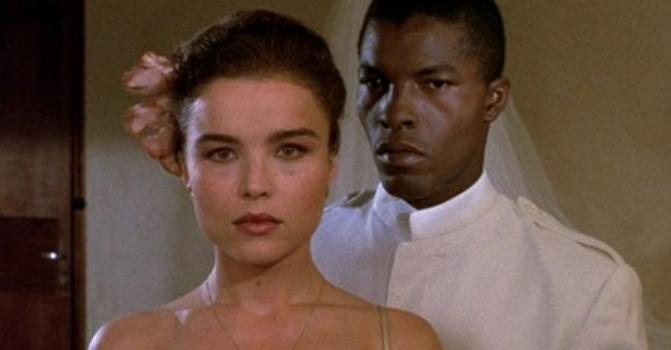
----------------------------------
France作为一个小女孩,代表法国的未来
France可以和Protée嬉闹作伴,也可以无所顾忌地学习原住民的语言
主仆之间界限愈发模糊
法国和殖民国愈发交融
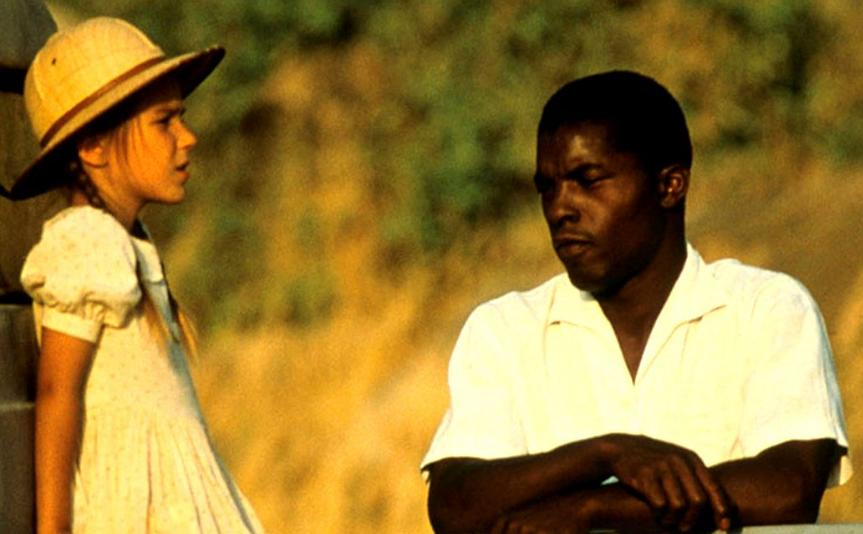
----------------------------------
从美国回到喀麦隆的人
知道这里是故乡
但却不是自己的地方(外来者)
“如果死在这里,就没人认识我了”
以肤色划分的界限没有那么清楚了
巧克力变了一个味道,但还是巧克力
-------------------------------------
看完这片我想起法国足球队的非洲雇佣军,姆巴佩就是有喀麦隆血统的法国人

---------------------------------------------------------
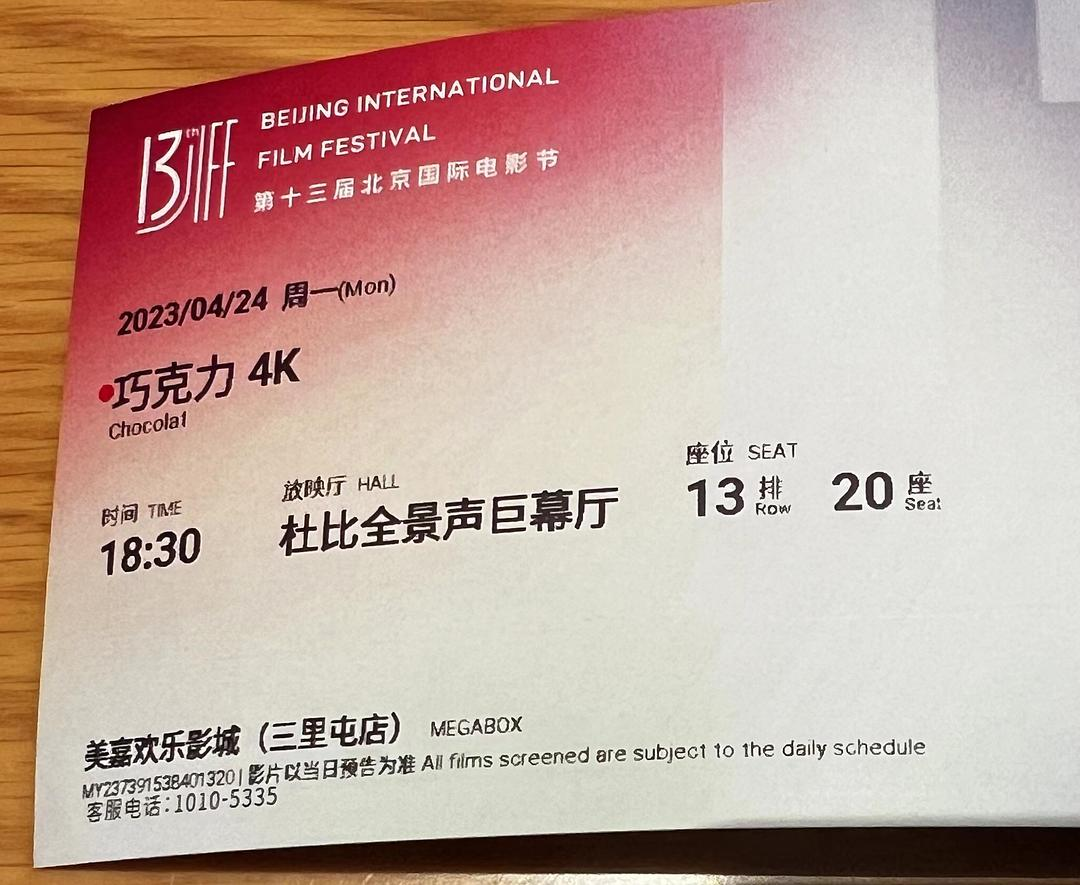
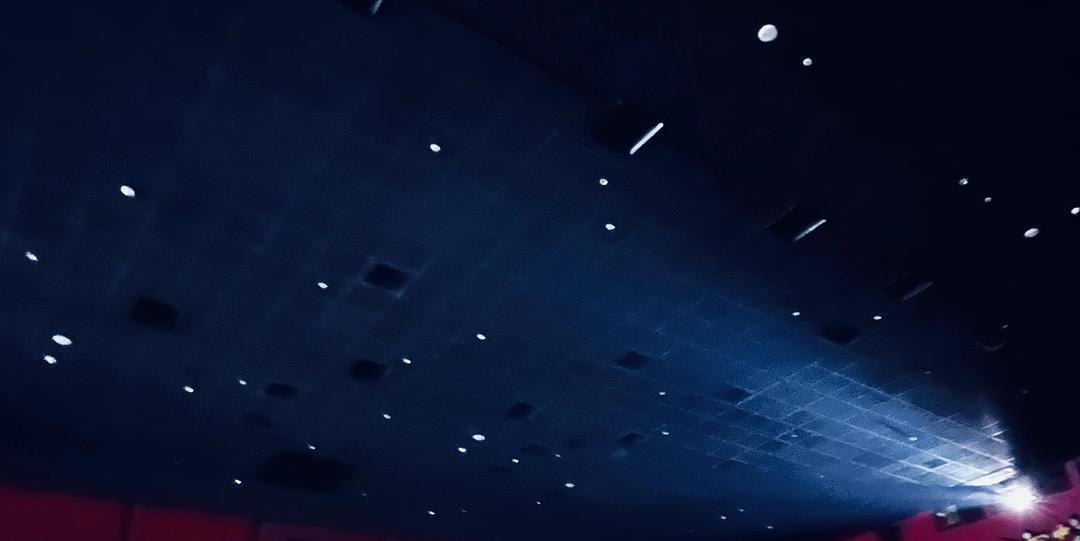
克莱尔·德尼的电影几乎都会出现非洲元素,如一对非洲兄弟在法国参与地下斗鸡的[不怕死];驻扎非洲的一支军队发生的[军中禁恋];后殖民时代中负隅顽抗的[白色物质]。德尼之所以偏爱非洲这片土地,这与她流动的非洲童年是分不开的。虽出生于电影之都巴黎,但尚在襁褓之中的她就跟随家人迁往了非洲,这一去就是14年。由于父亲是一名驻非殖民政府官员导致工作地点不停变化,童年到青少年时期德尼搬了很多次家,这样的经历使得德尼游历了不少非洲国家。她对这片广袤的土地产生了深厚的情感,这也成为日后她影片创作的重要灵感来源。
[巧克力]是克莱尔·德尼的处女作,也是一部半自传体长片。讲述了法国女子弗朗斯独身一人从法国回到这片记载着她童年时光的非洲大陆,想去寻找她曾经住过的房子。德尼以小弗朗斯的视角再现当时法属殖民地生活和黑人奴仆之间复杂的友谊。
故事发生的时间正是非洲大地的非常时刻,20世界50年代殖民势力日薄西山,影片中殖民者们也都朝不保夕、醉生梦死,昔日的野心和壮志被压制在一间孤岛般的房屋之中。他们就像生活在悬崖边上,所面临的危险不是非洲人的铁矛和弓箭,而是自身煞有介事的欧式生活仪式、秩序、伦理。白人和黑人、主人与奴仆,他们貌似安好地生活在这一片具有原始宽容与母性的土地上,但“致命”的危险美感却始终存在于整部影片之中,在非洲线条明朗清冷的天空中一触即发。
影片伊始于一片海滩,随着弗朗斯的目光我们将视线投注于躺在沙滩上的黑人父子,他们棕黑色的手臂在海水中浸泡着,似乎又听到那个小男孩天真地说:“啊,巧克力。”“巧克力”或许正是童年的弗朗斯(或者说童年的德尼)最初察觉到生活在非洲大陆人们的身体差别的第一联想。随后弗兰兹一个人在路上行走,好心的那对黑人父子载她一程,看着眼前的父子,画面跟着弗朗斯的记忆回到了从前。
德尼镜头下的非洲大陆并没有被过分渲染的贫困与野性,白人和黑人之间饱含着错综复杂的情感。比如,小弗朗斯与菩提之间的友情,在她的眼里白人和黑人可以不论肤色、不论年龄,可以成为朋友。她会将自己的饭分给菩提吃,会吃菩提抹满蚂蚁的面包。女主人艾米对菩提产生了情愫却压抑在心理,她通过各种小动作诱惑菩提却被拒绝,等到丈夫回来时,特意当着菩提面前与丈夫拥吻。因摸菩提的腿却得到冷漠无比的回应,艾米向丈夫提出将菩提调到车库工作,整日面对轰鸣的机器。
无论菩提与小弗朗斯的友谊,还是他与艾米之间暧昧的情愫,都无法单纯加以界定和判断。他们之间的纠葛既是欲望、情感上的较量,也是殖民主义者对非洲大陆欲望的一种隐喻。如影片中出现的三次”沐浴“场景。艾米(白种人/殖民者)不露缝隙的室内浴室和菩提等黑人奴仆使用的公共露天形成鲜明对比。“私人空间”在[巧克力]中是地位、尊严、也是欲望的象征。菩提的身体在光天化日下暴露,轻易便可被艾米窥得,正如他脚下的非洲大地,也是毫无遮掩与防范地接受殖民者贪婪的检阅。
虽然我们看不到杀戮、抵抗、征服和鲜血的镜头,但是白人与黑人之间的种族差距仍旧让观众印象深刻。一架飞机因故障不期而至,狼狈不堪的白人旅客被安排住进弗朗斯家,这些所谓的法国上层阶级的到来。他们颐指气使、高高在上,让殖民者百态尽显。种植园主把他的黑人情人藏在房间,理直气壮当着菩提面打包食物给情人;这些上层阶级悠闲的喝着咖啡,看着黑人修飞机;生病了也不让黑人医生治疗,嫌黑人肮脏。就像吕克读给艾米听的句子那样:“在黝黑的非洲人面庞中间,白皮肤会引起致命的后果。”
影片在戛然而止中结束,这一段落处理非常像是罗伯特·布莱松的反戏剧化电影风格:戛然煞尾,企图节制燃烧起来的情感,制造一种冷漠的美感。弗朗斯站在登机口,望着正在喀麦隆机场工作的三个非洲男人。他们正往机舱里搬运东西,工作结束后,他们闲适的抽烟休息聊天。德尼并没有拍他么在聊些什么,观众只听得见配乐声。这一切就如童年的弗朗斯无法用语言与当地人民沟通,只能用双眼去观察身边的一切,去体会这个世界。而弗朗斯作为德尼的化生似乎也在诉说她童年生活的经历,由于语言障碍德尼喜欢等待、观看和聆听。她渐渐变得沉默,正如她的作品一样,对白很少。
在“现在”的时间背景下,法国的成年女儿回到西非,寻找她与非洲过去的联系。反映了复杂的肤色和种族间的紧张关系,在殖民者与殖民地中爆发种族冲突,探讨被禁止的欲望以及归属感。颇值得玩味的是,弗朗斯的名字(France)就是法国(France),它曾是这片土地的创伤制造者。在拍摄[巧克力]那年德尼刚好40岁,也许只有到了这样的不惑之年,才能带着审视的眼光好好打量令她魂牵梦绕的故乡。这已经不再是40年前殖民者对这片土地的贪婪打量,而替换为一个“非洲女儿”的深情凝视,这凝视似乎会在时空中永远持续下去。
参考文献:《解码女性电影大师——用独特的身世诠释着女人特质的情爱方式》
《游离之间——克莱尔·德尼电影研究 》